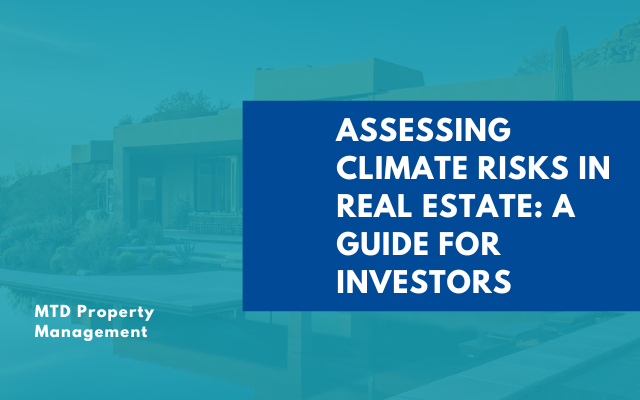Landlords collect a security deposit that’s equal to at least one month’s rent on or before move-in to cover unpaid rent or any property damages upon move-out. It is an assurance that tenants will abide by the house rules and avoid causing damage through negligence and carelessness.
Security deposits are refundable to encourage tenants to take care of the property and get their deposit back. But there are things that you cannot control, and tenants can break the lease or rules during their stay. And while asking for a security deposit is a good strategy, it doesn’t always cover the total amount of unpaid rent or the cost of damages.
If you find yourself in this unfortunate situation,
MTD Property Management is here to help! We’ve put together this article to guide you on what to do.
1. Inform Your Tenant
The first thing you need to do when withholding the security deposit is to let your tenant know in writing. If and when you need to send the letter will depend on your state, so be sure that you are knowledgeable about your state's laws.
When communicating with your tenant, be clear when explaining why you’re withholding the deposit and how much. Send an
itemized list of deductions indicating the damage costs as well as cleaning fees.

This will let your tenants understand what repairs are being done and why they are not going to receive the full deposit back. If the security deposit won’t cover all the damages, consider sending a demand letter to the tenant.
2. Send Your Tenant a Demand Letter
If you calculate the cost of damages and unpaid rent and the total ends up being more than the security deposit, send your tenant a demand letter for the remaining amount. The tenant must then pay for the remaining amount of money owed.
When writing a demand letter, it should be specific and you should include a contact number where your previous tenant can reach you to settle the amount or raise any questions that they may have.
Aside from your phone number, a good demand letter must include the following:
- Itemized damage and their corresponding repair costs.
- Any relevant cleaning fees.
- Any unpaid rent.
- The amount you’re asking for.
- Date when the amount must be paid.
3. Consider Small Claims Court
When the tenant pays the remaining amount they owe you, both of you can move on and your landlord-tenant relationship has finally come to an end. But, if the tenant chooses to ignore the demand letter and the due date has passed, you can consider taking up the matter with the small claims court.
The court will hear your case and decide accordingly. If you win the case, your tenant must pay what they owe you. However, before proceeding, you have to consider the amount of money owed to you and the pros and cons of taking legal action.
Legal Proceeding Can Be Time-Consuming
Taking matters up to small claims court can take up a lot of time. You have to prepare yourself and your case. To do this, you have to know the small claims court process, organize all of your evidence, and attend court hearings in the town where your property is located.
You will also have to be financially ready as you have to pay for the filing fee with the small claims court. This fee is required whether you win or lose the case.
Tenants May Lack Resources
Winning the case in small claims court doesn’t guarantee that you’d be able to collect the money you are owed. If the tenant doesn’t have the resources or funds to pay you, you won’t be able to collect the money or would have to give the tenant time to gather the funds to pay you.
You Might Have a Lack of Proof
Presenting your evidence is crucial when the matter is taken to court. Organize all move-in and move out inspection checklists and any photos or documentation that proves the tenant caused the damage.

You also have to keep the receipts for the repairs and cleaning needed to restore it to its original condition. Your payment tracker or any evidence that proves the tenant failed to pay rent must also be compiled to submit in court. Evidence is key and if you don’t have it, the
judgment might not be in your favor.
There Is the Possibility of a Counter Lawsuit
You must be knowledgeable about federal and state landlord-tenant laws as well as your and your tenants’ rights. If you have not done everything according to the rules, your tenant might file a counter lawsuit and you will owe them money if they win the case.
4. Conduct Regular Inspections
Check on your property’s condition and schedule regular inspections. Your tenants have the right to privacy in their homes even if you own the property so if you plan to do the inspection regularly, add a clause to the lease agreement and always respect your tenants by giving them a heads-up that you will be visiting in a few days. Also, make sure that the inspection happens only a few times a year to avoid losing your tenant’s trust.
When doing the inspection be mindful of distinctive smells, wall damage, broken furniture, pet stains, and working or defective appliances.

5. Create a Move-In and Move-Out Checklist
Make sure that you do a walk-through during move-in and move-out and fill out the checklist. This way, you can easily identify the damage to the property and the corresponding repair costs that need to be taken out from the security deposit. You can give the tenant a chance to fix the damage before they move out so they can still get a full refund of the security deposit.
6. Screen Your Tenants Thoroughly
To avoid property damage and chasing payments, it’s important to properly
screen potential renters before asking them to sign the lease. This process will help reduce major issues when the tenant moves in.
Bottom Line
At MTD Property Management, we offer full-service leasing and advertising, regular property inspections, and tenant care to maximize your income and minimize your expenses. Contact us today!










